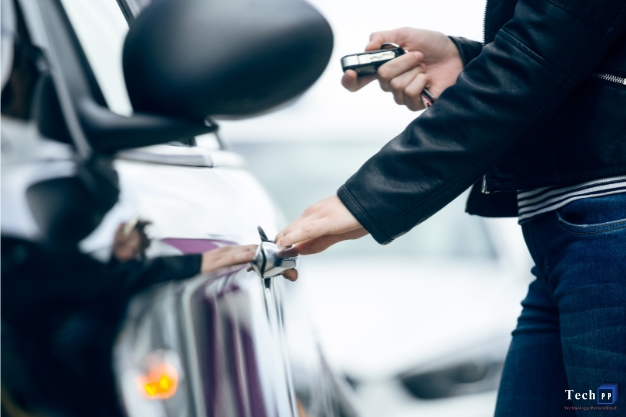Car Security 101! Vehicle theft affects millions of car owners every year, leaving them dealing with financial losses and the inconvenience of replacing their transportation. Protecting your car requires a strategic approach that combines smart habits, technology, and awareness. Understanding the most effective security measures can significantly reduce your risk of becoming a victim.
Start With Basic Prevention Habits
The simplest security measures often prove most effective. Always lock your doors and roll up windows completely, even for quick stops. This basic step eliminates opportunities for thieves looking for easy targets.
Park in well-lit areas whenever possible. Thieves prefer working in the darkness where they can operate without being seen. Choose parking spots near building entrances, security cameras, or areas with heavy foot traffic. These locations naturally deter criminal activity.
Never leave valuables visible inside your vehicle. Items like phones, laptops, purses, or shopping bags attract unwanted attention. Store these items in your trunk or glove compartment before reaching your destination. Even small items like loose change can signal to thieves that your car might contain other valuables.
Remove or hide aftermarket accessories when parked. Expensive stereos, GPS units, and other electronics advertise your car’s value to potential thieves. Consider investing in removable faceplates for stereos or taking portable devices with you.
Secure Your Keys and Entry Points
Key security represents a critical vulnerability that many drivers overlook. Never hide spare keys on or under your vehicle. Professional thieves know all the common hiding spots and will find them quickly.
Protect your key fob from signal cloning attempts. Store keyless entry fobs in metal containers or special pouches that block radio frequencies. This prevents thieves from copying your signal while you sleep or work nearby.
Consider upgrading to smart locks or additional deadbolts for older vehicles. These systems provide extra security layers that make unauthorized entry much more difficult and time-consuming.
Replace worn or damaged locks promptly. Locks that stick or feel loose may fail when you need them most. Regular maintenance of entry points ensures they function properly when security matters.
Invest in Electronic Security Systems
Modern security technology offers powerful tools for protecting your vehicle. Car alarms remain effective deterrents when properly installed and maintained. Look for systems that include motion sensors, glass break detection, and loud sirens.
GPS tracking devices provide recovery options if theft occurs. These systems allow law enforcement to locate stolen vehicles quickly, increasing recovery chances significantly. Many tracking systems also send alerts to your phone when unauthorized movement occurs.
Steering wheel locks create visible deterrents that many thieves will avoid. While not foolproof, these devices require additional time and tools to bypass, often encouraging thieves to seek easier targets elsewhere.
Consider remote start systems with security features. These systems often include additional anti-theft measures and allow you to warm up your car from inside your home, reducing time spent in vulnerable parking areas.
Enhance Physical Security Measures
Physical barriers provide excellent security when combined with other measures. Window tinting reduces visibility into your vehicle while providing other benefits. Professional services like window tinting in Salt Lake offer various opacity levels that balance privacy with legal requirements.
Install security film on windows to make breaking glass more difficult. This transparent film holds shattered glass together, slowing down thieves and creating noise that attracts attention.
Use tire locks for long-term parking situations. These devices prevent vehicles from being driven even if thieves bypass other security measures. They work particularly well for vehicles stored in driveways or parking lots for extended periods.
Secure your license plates with anti-theft screws. Replacing standard screws with security versions prevents thieves from stealing your plates for use on other stolen vehicles.
Maintain Situational Awareness
Stay alert to your surroundings when approaching or leaving your vehicle. Thieves often watch for distracted drivers who make easy targets. Keep your head up and scan the area before getting in or out of your car.
Trust your instincts about suspicious activity. If something feels wrong about a location or situation, leave immediately. Your safety matters more than convenience or parking fees.
Vary your parking routines when possible. Parking in the same spots at predictable times can make you a target for thieves who study patterns. Mix up your routes and parking locations occasionally.
Report suspicious activity to authorities. Information about potential thieves helps police prevent crimes before they occur. Your report might save another driver from becoming a victim.
Know Your Insurance Coverage
Review your insurance policy to understand theft coverage limits and requirements. Some policies require specific security measures for full coverage. Understanding these requirements helps you make informed decisions about security investments.
Document your vehicle’s condition and contents regularly. Photos and receipts create evidence for insurance claims and help prove ownership of recovered property.
Protecting your vehicle requires combining multiple security strategies rather than relying on any single measure. Start with basic habits like locking doors and parking wisely, then add technology and physical barriers as your budget allows. Remember that visible security measures often deter thieves more effectively than hidden ones.


